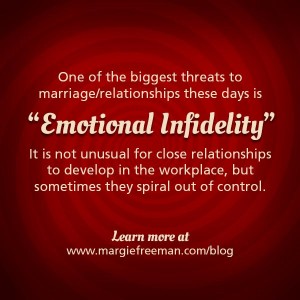One of the biggest threats to marriage/relationships these days is “emotional infidelity.” It is not unusual for close relationships to develop in the workplace, but sometimes they spiral out of control. Do you find yourself keeping thoughts and feelings from your partner? Keeping secrets and trying to cover your tracks? Do you find yourself thinking about your special work friend and opting out of activities with your partner or your family? If so, these could be warning signs of emotional infidelity. If you spend extended time alone with your friend, you are “playing with fire.” That is when friendship often crosses the line from platonic to sexual.
 Even if your friendship does not cross the line, when you share your deepest concerns, hopes, and dreams with this friend at work, it builds an emotional bond and deepens feelings of intimacy. If you start confiding in this friend about what is wrong with your partner or with your marriage/relationship, it can be viewed as a betrayal of trust. You may start to compare your mate with your work friend and conclude that your friend understands you better than your partner does. You gradually build a case in your mind, justifying your avoidance and mistreatment of your partner and your fantasized love relationship with your friend.
Even if your friendship does not cross the line, when you share your deepest concerns, hopes, and dreams with this friend at work, it builds an emotional bond and deepens feelings of intimacy. If you start confiding in this friend about what is wrong with your partner or with your marriage/relationship, it can be viewed as a betrayal of trust. You may start to compare your mate with your work friend and conclude that your friend understands you better than your partner does. You gradually build a case in your mind, justifying your avoidance and mistreatment of your partner and your fantasized love relationship with your friend.
The intensity of emotional infidelity can be viewed as an addictive process. The neurochemicals that get activated when you think about and interact with this person are addictive. When you are addicted to a person, a substance, or an activity, you are not able to think clearly and make informed choices. These neurochemicals give you that quick fix of pleasure and reward the toxic pattern. An addiction to an activity, person or substance puts you in an intoxicating trance that does not allow you to think clearly. The “love addiction” helps numb feelings of pain, shame or guilt and provides temporary escape from the responsibility of resolving the real issues of your marriage and your life.
If you find yourself “obsessed” with a friend at work (or elsewhere), it may be time to explore these feelings with a therapist and get clarity about the addictive process that is occurring. It is time to address the issues in yourself and in your primary relationship.
